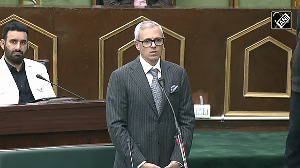While India is slogging out against Pakistan in a cricket test match in Kolkata, another face-off is tipped to be developing here between two bankers with origins in the two countries -- that for the position of CEO at world's largest bank Citigroup.
The list of contenders for this job include Vikram S Pandit, currently Citigroup's investment banking head and a former Morgan Stanley investment banker, and Shaukat Aziz, formerly the bank's global private banking business head and most recently the prime minister of Pakistan, according to various media reports.
According to a report in The New York Times this weekend, Citigroup board expects to name a new CEO next week and Pandit's name has emerged as a favourite, although no clear choice has emerged so far.
Meanwhile, reports have been surfacing in the United States and international media that Aziz, who resigned as Pakistan's prime minister last month, could also be a potential candidate and has already sent his feelers to Citigroup board.
Queries sent by PTI on the candidature of Pandit and Aziz to Citigroup spokesperson Christina Pretto remained unanswered.
The CEO position fell vacant after Charles Prince resigned as Citigroup's Chairman and CEO at an emergency board meet on November 4 on the back of losses worth billions of dollars suffered by Citigroup in the subprime crisis.
After Prince's departure, Citigroup named its Europe chairman Win Bischoff as an acting CEO and its executive committee chairman and former US Treasury Secretary Robert E Rubin as chairman on interim basis. Rubin is also part of a search committee for the new chairman and CEO and this committee has been reviewing candidates from both inside and outside the bank.
Pandit's name as the next CEO started doing the rounds ever since it became known that Prince would put in his papers, but the bank had decided to review other candidates as he is rather new at the bank. He took over Citigroup's investment banking operation in early October, just six months after joining the bank.
The search committee is now leaning in favour of an insider for the top job and Pandit's name has emerged as a favourite, The New York Times report said.
However, the daily was told that no final decision had been made and the search committee was also reviewing other potential candidates as well.
If Pandit is appointed as Citigroup's chief executive, he would be the first Indian to head a leading global bank. A former professor at Columbia University, Pandit had earlier headed Morgan Stanley's institutional securities business before starting a hedge fund that he later sold to Citigroup for $800 million.
The New York Times report said that Pandit's experience in emerging markets, including his native India, could help sell Citigroup's strategy to become even more international. Meanwhile, an Economist.com report said that Shaukat Aziz could be a good choice for the post. "The 58-year old joined Citibank in 1969, and worked in various parts of its global empire -- including Britain, Greece and Malaysia before eventually becoming global head of Citi's private bank. So he knows the firm week, and certainly has good international experience," the report noted.
It further noted that Aziz might be tempted to find an exit from Pakistan politics, given its current state of emergency.
After Aziz resigned as prime minister last month, Pakistani daily The News reported he was looking forward to return to his previous organisation Citigroup. However, a government spokesperson had strongly denied any such move through a statement issued the very next day on, November 16, and said that a large number of cabinet members wanted him back in the office of prime minister and had wished him success in the future elections.
However, Aziz, who was previously reported to be running for elections there, made it clear last week that he would not contest the general elections being held in early 2008.
Both Pandit and Aziz are known to be very close to the Citigroup Chairman. Rubin was instrumental in bringing Pandit to Citigroup about seven months back, while he also shared a close camaraderie with Aziz.
Aziz had started his career with Citibank in 1969 in Karachi and later served as its head of corporate and investment banking for various regions, including the Asia-Pacific and Mid-East.
Before leaving Citigroup to become Pakistan's Finance Minister in 1999, he was the head of its private banking division.
Interestingly, Rubin had exhorted Aziz to take up his new job in Pakistan government at that time. While addressing a Council on Foreign Relations event of the US government on September 25, 2006, here that was attended by Pakistan President Pervez Musharaf, Rubin said that Aziz came to him when he was appointed Pakistan's finance minister and asked: "What is it like to be a finance minister?"
"It's a piece of cake," Aziz was told by Rubin, who himself had been a treasury secretary, equivalent to finance minister, in the Bill Clinton government. Aziz became Pakistan's finance minister in November 1999, while he was sworn in as the country's prime minister in August, 2004.






 © 2025
© 2025